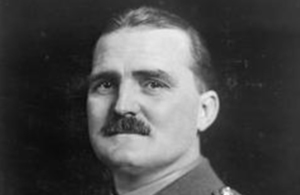WW1 South African VC recipient John (Jack) Sherwood-Kelly
The story of South African First World War Victoria Cross recipient John (Jack) Sherwood-Kelly.

John (Jack) Sherwood-Kelly [Credit: © IWM (detail of Q 68324)]
14 men from South Africa received the Victoria Cross, Britain’s highest award for gallantry, during the First World War. As part of the Centenary Commemorations the people of the United Kingdom marked their gratitude to those courageous men by presenting a bronze memorial plaque to their home country engraved with their names. The plaque is now displayed at the Castle of Good Hope, Capetown. This archive tells their stories.
Name: John (Jack) Sherwood Kelly
DOB: 13 January 1880
Place of Birth: Lady Frere, Eastern Cape, South Africa
Date of Action: 20 November 1917
Place of Action: Marcoing, France
Rank: Acting Lt Col
Regiment: Norfolk Regiment, British Army
John (or “Jack”) Sherwood-Kelly was born in the Eastern Cape of South Africa on 13 January 1880. He began his military career at the age of just 16 in Matebeleland. During the First World War, he fought in Gallipoli, where he was awarded the Distinguished Service Order in 1916, and later on the Western Front with the Norfolk Regiment of the British Army.
Acting Lt Colonel Sherwood-Kelly was awarded the Victoria Cross for his actions at Marcoing on 20 November 1917 which were instrumental in the early Allied success of the Battle of Cambrai. HIs citation explains in detail:
For most conspicuous bravery and fearless leading when a party of men of another unit detailed to cover the passage of the canal by his battalion were held up on the rear side of the canal by heavy rifle fire directed on the bridge. Lt Col Sherwood-Kelly at once ordering covering fire, personally led the leading company of his battalion across the canal, and after crossing, reconnoitred under heavy rifle and machine gun fire the high ground held by the enemy. The left flank of his battalion advancing to the assault of this objective was held up by a thick belt of wire, whereupon he crossed to that flank, and with a Lewis gun team, forced his way under heavy fire through obstacles, got the gun into position on the far side, and covered the advance of his battalion through the wire thereby enabling them to capture the position. Later, he personally led a charge against some pits from which a heavy fire was being directed on his men, captured the pits, together with 5 machine guns and 46 prisoners, and killed a large number of the enemy. The great gallantry displayed by this officer throughout the day inspired the greatest confidence in his men, and it was mainly due to his example and devotion to duty that his battalion was enabled to capture and hold their objective.
In later years Sherwood-Kelly worked in Bolivia, and entered politics in England. He died in 1931 and was buried in Surrey.